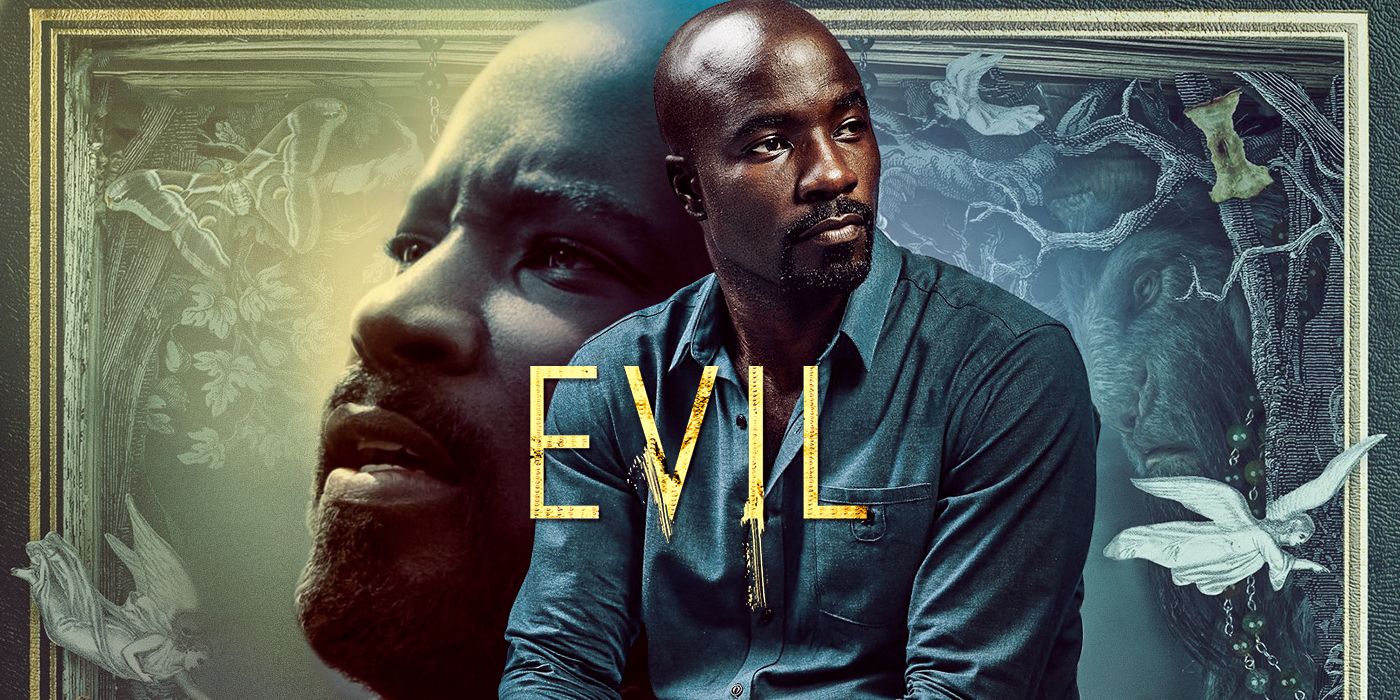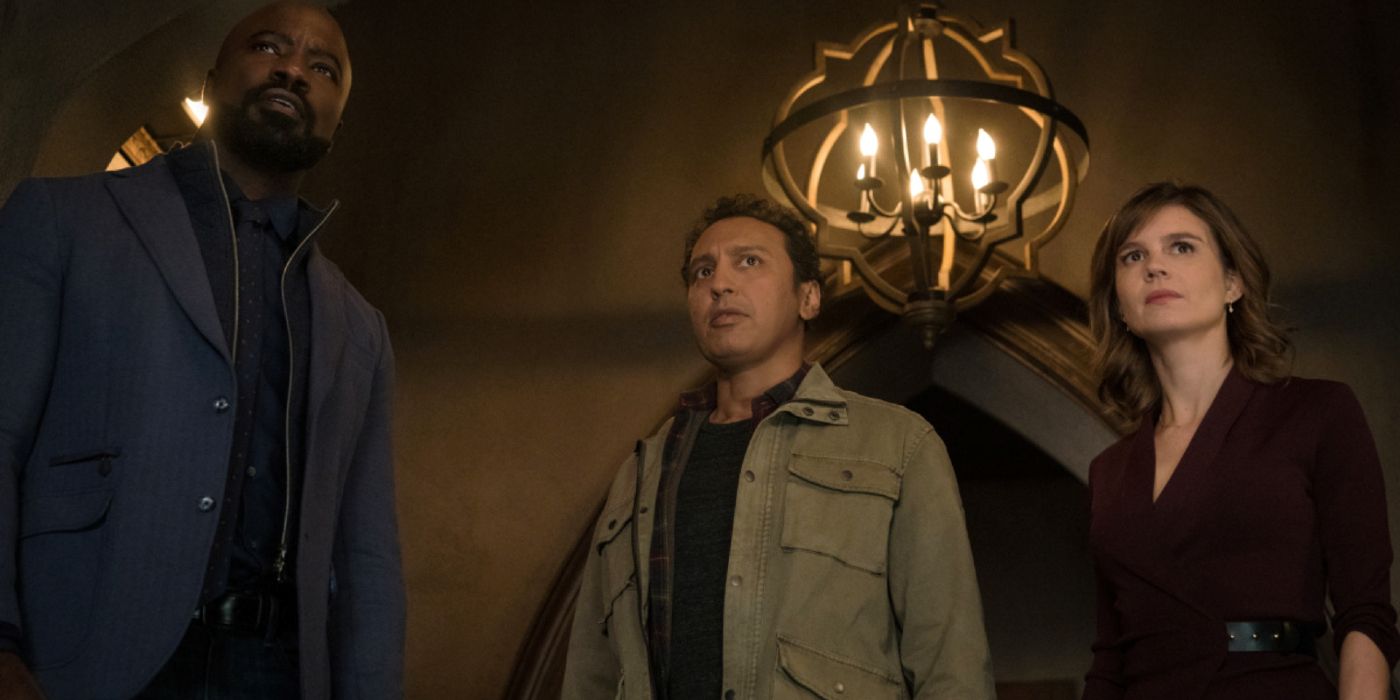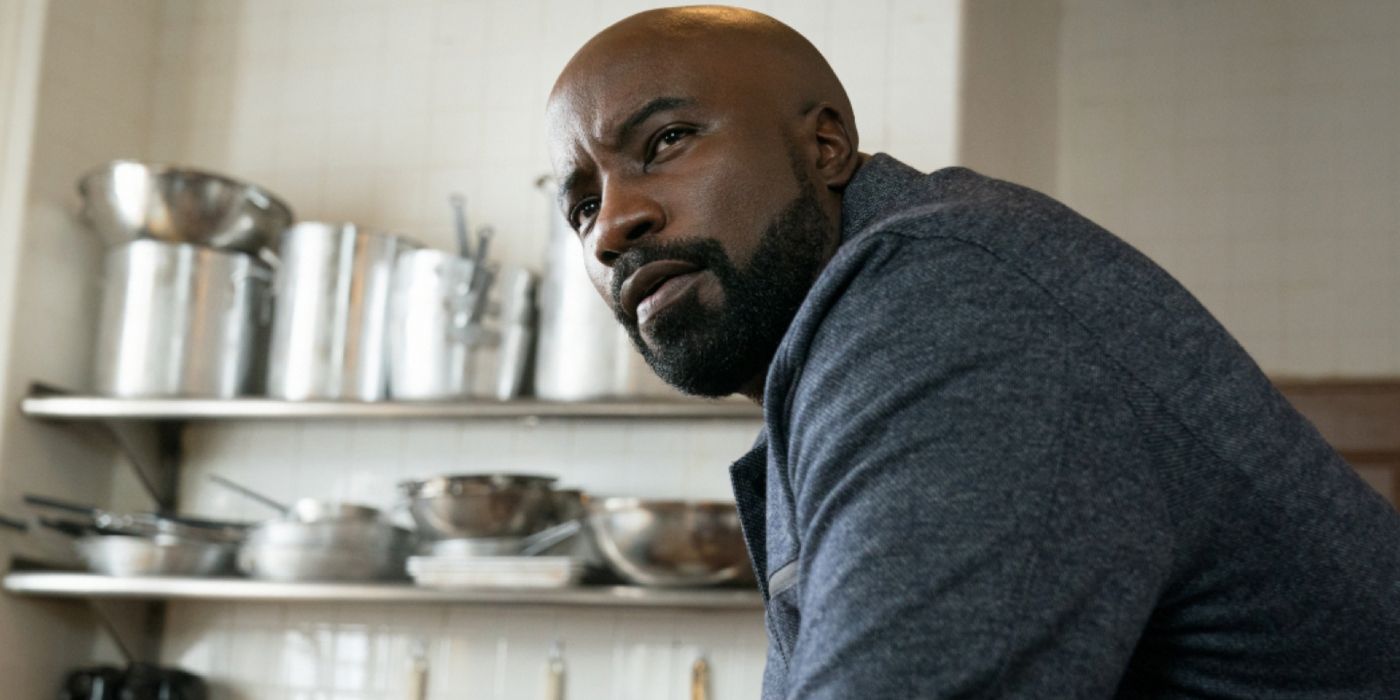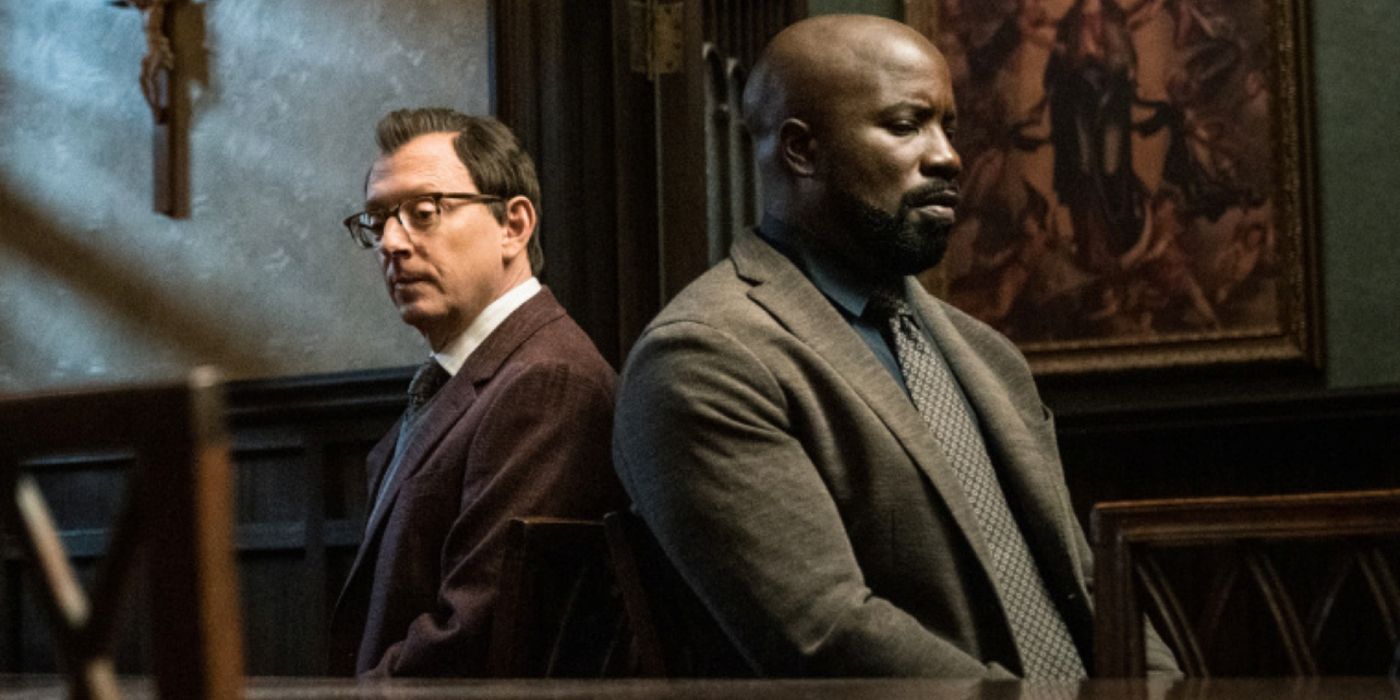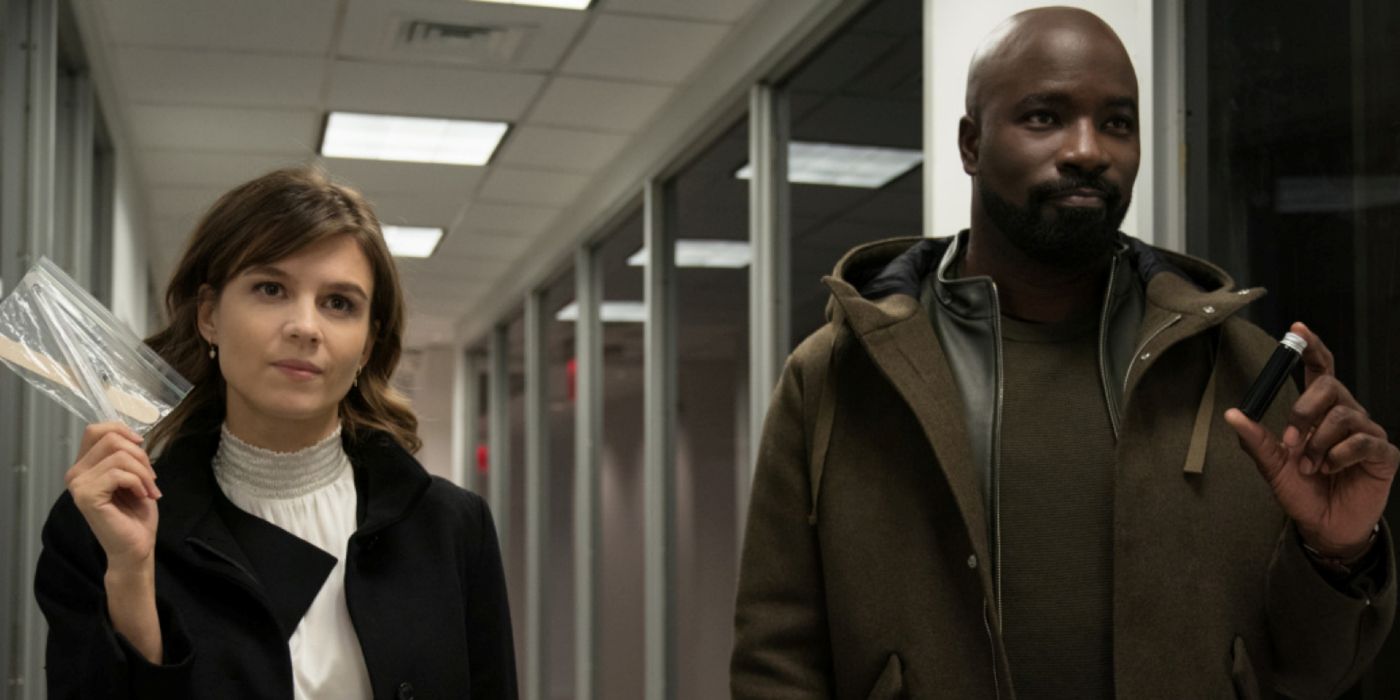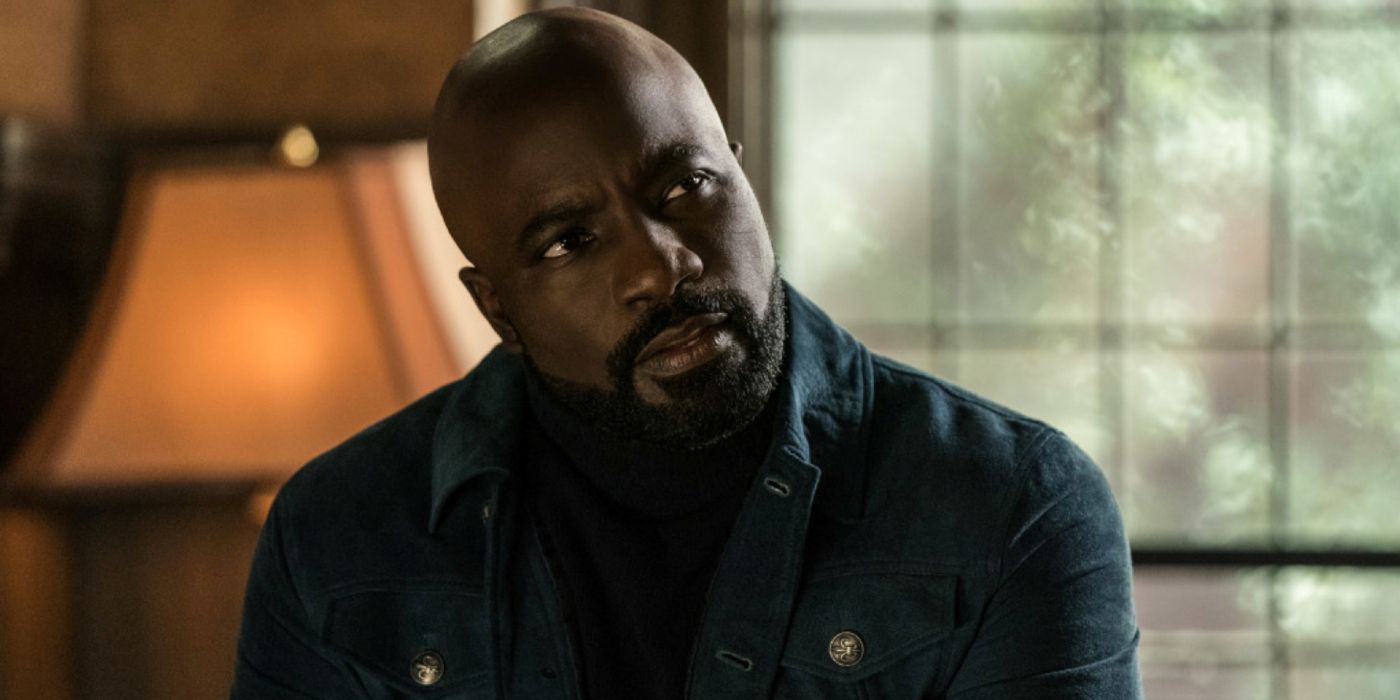From show creators Robert and Michelle King (The Good Fight, The Good Wife), the psychological mystery series Evil, which is available to stream at Paramount+, explores the line between science and religion and questions whether evil really lives among us. As Kristen (Katja Herbers), David (Mike Colter) and Ben (Aasif Mandvi) continue to dig into unexplained events, including possible miracles, demonic possessions and hauntings, in search of whether something has a logical explanation or could be the result of something truly supernatural, strange occurrences happening in their own lives are preying on their greatest fears.
During this 1-on-1 virtual interview with Collider, Colter talked about finally nourishing the fans with new episodes, what he thinks makes Season 2 great, the question mark as to what’s really going on with Kristen, what it’s like for David to have to endure Leland (Michael Emerson), his collaborative relationship with the Kings, and setting things up for Season 3. He also talked about his time playing Luke Cage, and never getting closure for a role that still had so much possibility.
Collider: What are you most excited about with Season 2 of Evil and the story you’re telling, especially knowing how long fans of the show have been waiting to see new episodes?
MIKE COLTER: We can’t begin to really satisfy and to make up for the long overdue wait the fans had to endure, for so many various reasons. All we can do is feed them, at this point. It’s like a restaurant. You’ve been standing outside, the wait was long, you were hungry, your stomach got to the point where your hunger had subsided and you’re just there, and you were hoping to eat, but at some point, you’re like, “Am I just gonna go home with no food? What am I gonna do?” Well, we’ve found a table for you, and now you get to sit down and consume the food. It won’t be disappointing. Hopefully, you’ll love it.
We have a great season, I think. It subtly ascends and gets better and better. I think the shifts of Season 2 are a lot more subtle and a lot more gradual, throughout the season, than it was for Season 1. In Season 1, Episode 1 really set us up, Episode 4 is when we found ourselves and found our groove, and Episode 8 was like, “Whoa, this is a really crazy show with a baby in a cornfield. What is going on?” You get to Episode 10 in a hospital, it’s a standalone, and you don’t even know what you’re watching. And then, Episode 13 had such a huge cliffhanger. I really feel like Season 2, in terms of gradual ascending of plot line, really gets stronger and stronger. By the end of the season, we’ll have a very good cliffhanger, I feel, that really puts people in a situation where they have to come back for Season 3, which is what you want. You want that.
The first question that I had with this show was, does it pick a right up where it left off? With the first season finale leaving everyone wondering whether Kristen is possessed herself, was that the question you had, or did the Kings give you any definitive answers about it when you did the finale episode? Did you know where that would be going?
COLTER: No, I wasn’t a hundred percent sure where that was gonna be going. I think they told us, at some point before we started filming. Time seems to have escaped me, in terms of what when something happened and whether it during the season or prior to the season. At some point, we knew the trajectory of what the character was going to be doing, in any given moment, in terms of possession or not possessed, and things of that nature. But there was a question mark, and I think it’s good to have a question mark, throughout the season, for all of the audience members, all of the people who are watching, and the fans. I think they really wanna continuously try to figure out what’s going on with her. That’s a great place for her character to be and that’s a great place for them to be, as the viewers. We had same questions. I wasn’t sure. We were like, “Oh, boy!” We were like, “Are we gonna have to exorcise Kristen? Do I have to put my hands on her too? Is somebody gonna have to put their hands on her?”
Do you personally enjoy when things are left a bit more ambiguous in the storytelling, or are you someone who prefers getting direct and definitive answers to things?
COLTER: No, ambiguity is where we live. I think we have to live there because we have such a strong argument and such strong, tangible evidence for either side, in terms of what they believe. How can we answer that definitively for anyone? We’re representing all sides in somewhat equal fashion, so how do we then turn around and definitively define what is or is not? A lot of times, we leave it open-ended, and even though it may seem like there’s an answer, there’s always a certain amount of unanswered questions, if you pay attention to the entire episode. You go, “Okay, well, that appears to be this way,” but if you really think about the pieces of the puzzle that we’re not answering, you’ll go, “Well, what about that? They’ve never talked about that.” People still ask some questions about the first season. They’re like, “That’s fine, but what about this?” And to that end, we have no answers, or answers that we’re willing to give.
When you do a show like this, does it make you look at and evaluate your own beliefs differently, or does it really just reinforce what your own beliefs are?
COLTER: I think it always calls into question your own beliefs, to some degree. You always have to figure out, what about this thing makes me question my own stance? And anytime you come into contact with that, most people brace and they shut down and they go into this mode of being triggered, where they can’t deal with it because that’s not their reality and they don’t wanna interpret or take in the new information that they’re getting. New information scares people because that requires us to change. We don’t wanna change and go, “Wow, do you mean to tell me that I’ve walking around and thinking the wrong thing for however long?” For some people, that’s refreshing. They want that, so then they can go, “Okay, well, at least I can change and move on.” Now that they have the actual answers or the actual real information, they can live life based off of that new information that they’ve received, as opposed to consistently doing the same thing. I think that’s a scary thing for people. They don’t wanna know.
I was really happy when I found out some things that they would call life hacks. Sometimes you find these things where you’re actually like, “Wait a minute, I could just do it that way? Why not?” If you look at life hacks, they’re so simple and so small, like the pillow thing where you can put the pillow on in five seconds, if you just do it the right way with the corners in. That’s a life hack. There’s a way to peel a boiled eggs that could take you 20 seconds less. That’s a little life hack. These are things that you can implement and boom, look at how much life you’ve saved. If you compare that to deeper notions and deeper ideas, it’s just as tangible to have a better sense of understanding than to walk around with blinders on, just doing the same thing over and over.
Your character is the one on his team that’s on a belief island by himself while everyone else is a bit more skeptical than he is. Because of that, I really love the dynamic that we get between him and the nun. Was it nice for him to have someone that he can talk to and share ideas with, who is a believer like him?
COLTER: Oh, yeah. I think the character was definitely introduced for that purpose, to allow David to have a conversation with someone who actually understands and believes, so we’re not always in conflict about ideas and so we can get a little deeper into what people like David are and what they feel, so now we can understand them a little better and connect with those ideas a little better. The debate is great, but at some point, we have to have a conversation, in both places, of some depth, so that we can connect with the characters and understand how they see the world. Sister Andrea was introduced for that purpose. It was really important.
Leland is such an interesting character because he’s always manipulating everyone about everything and we still really have no clue what his true motivation actually is. What was your reaction to finding out that he’d essentially be the case of the week for this team and that they would have to take him on, in that way?
COLTER: Leland is so annoying. David hates him. He doesn’t really want to be in the same room with him. It’s just a burden. It says so much about him that everyone hates him. To that end, to finally have to deal with him, you can’t even imagine what that feels like. We’ll have to endure this for quite a bit of time, until we can figure out what to do with this person. But the thing is, there’s also a part of the story where you try to figure out, maybe Leland actually needs help. Maybe Leland actually is a person that needs help and maybe this is something that they can help him with. But first, you have to believe him.
Could you ever have imagined that you’d be playing a character who has nightmares of Michael Emerson dancing around in a field?
COLTER: Oh, my God, never. I never saw that coming.
I love that visual. It just was so great, especially with such a creepy character.
COLTER: I know.
What do you enjoy about what Michael Emerson brings to the show? There’s something so unpredictable about that character that it must be really fun to do scenes with him.
COLTER: He is the comic relief of this show, in places where it’s seems inappropriate to have comic relief. To that end, we’re able to give the audience a little bit of a breather, in terms of always feeling on edge or like something’s gonna happen or what’s gonna happen next. That allows people to breathe a bit. When you’re watching a show like this, when you can find places to relax and take your foot off the gas, in terms of edginess and feeling like there’s an anxiety about something lurking around the corner. That gives people a chance to relax and to get comfortable, to then get scared again, or be like, “Okay, here we are again.” You’ve gotta have those shifts of tone, and I think he allows us to do that.
You will always be identified and remembered as Luke Cage. Your performance in that show was so great and you brought so much to that character, and you got to do that cameo appearance in the Jessica Jones series finale. What was it like to get to go back and do that, since you didn’t really get the chance to wrap up Luke Cage’s story on his own show? Did having that give you any sense of closure, to get to play that character again?
COLTER: To be honest, no, it didn’t give me a chance to have any closure. There were so many places we could have taken it. There’s obviously the Alias series where Jessica and Luke had a child and had this adult life they were trying to live, and there’s this moment where they are working out their blue collar, making ends meet life together, which is very interesting. There’s the journey that Luke had in his own series with Harlem’s Paradise, where he’s taken over the club, and is he gonna be a bad guy or a guy that is on the other side of the law, and who’s gonna stop him. That was another interesting thing to watch, with him maybe being a little gangster, and that would’ve been cool too. So, I don’t think there’s any closure to it, nor do I feel like we were able to get any of that closure by having the appearance in Jessica Jones, but it is what it is. It’s one of those things where we’ll just never know. There are a lot of shows that live in that space where it’s like, “Oh, man!” It’s unfortunate, but that’s just one of the things that happens in television sometimes.
Obviously you have to say goodbye to every character you play, at some point, but is it bittersweet to say goodbye to a character when it does feel like there was still so much more of his story to tell?
COLTER: When it’s a premature goodbye? Yeah, of course. I think so. The positive thing about something like that is you’ll always have a fond memory of something that didn’t stay too long. It’s like a relationship or anything else that never reached its peak or it’s descent. You don’t have any negative memories of it because it will live in this place of perfection, or some sense of promise, at all times in our life. It’s a fond, romanticized notion of what could have been.
What is your collaborative relationship like with Robert and Michelle King? You have a history with them, so what’s it like to work with them? How actively do you get the opportunity to make suggestions with them?
COLTER: I just try to stay out of their way. They’re really good at what they do. I email and text sometimes, just to figure out, does this mean what I think it means? Are we going in this direction? Maybe I’ll ask about a line. I try to stay out of their way. Very few times, I really feel like I wanna have a conversation. The great thing about it is that they let us do what we do and they do what they do. If it works, there’s an autonomy and an understanding of the process in which they work and the process in which we work. It’s a great working relationship and I couldn’t ask for more. It’s really just been great.
Have you already had conversations about what Season 3 could look like and what you might continue to explore?
COLTER: Yeah.
Are they more general, bigger picture conversations, or is it more specific?
COLTER: Oh, yeah, absolutely. We’ve definitely had a conversation. There’s so much promise of where it could go. Once you get to the last episode of Season 2, it’s a lot to consider. So, I know, in general. It’s got a lot of potential, what we could do with it, and it’s gonna be great. We’ve discussed it, but now we’ve gotta see if we’re gonna get a chance to show that.
This show really is a combination of so many things, but for me, it’s really the psychological horror aspect that stands out. That’s the thing that haunts me when I think about this show. How do you view the show? Is there a genre or an aspect of it that most speaks to you?
COLTER: I think you really hit it. It’s the psychological fear factor of what you really are dealing with and who’s really the bad guy, or the person that you have to concern yourself with or worry about in the world. The thing we talk about all the time is that evil eludes to a lot of different things. I want people to understand that evil comes in such small increments and such small doses, at any given moment in our day, and it’s not always consistent. Everybody who’s evil or who has evil in them, isn’t always evil. There’s a real misunderstanding, I feel like, from the aspect of evil being one way and good being the other thing. There’s such grey matter in between it that connects the two, that we’re often trying to only stay on one side or consider one side, and to that end, we cannot do that. That’s not really possible. And so, people have to understand that we all have the potential to be good, but we also have the potential to be evil.
We talk about the good deed of the day or the week, but that alludes to the fact that you’re not doing good deeds all along. They pulled over and helped someone change a tire, or they considered helping someone do something out of the ordinary because it was selfless, but that alludes to the fact that that’s not the norm for them, otherwise it wouldn’t be their good deed. People say that all the time, so what else are you doing, the rest of the day? Are you walking through life with blinders on and being a selfish prick? Are you evil most of the time and this is your one moment of clarity for doing something good and that’s not about you. I feel like that’s where this show lives, in that area of reality. It’s not what we want it to be, but what it is.
Aside from the great writing and the great acting from the cast of this show, one of the reasons Evil made my list of best television is because it really does sneak up on you. It’s never exactly what you expect. It always stays with you and haunts you and makes you think about things you didn’t realize you’d be thinking about, and I love that.
COLTER: Yeah, I agree. It does sneak up on you, in every way, from the title to the presentation to what you think you were sitting down to watch and what you are looking forward to seeing in the next episode.
What can you say about David’s arc specifically, this season? What have you enjoyed about what you’ve gotten to explore with him?
COLTER: What I’m really looking forward to enjoying about the season and what the fans can look forward to is basically watching David slowly unraveling by the end. There’s this idea and this nagging feeling about whether what he’s doing is right. He’s doing it for a purpose. He’s doing it so he can serve God and find a safe haven for himself. This has been a place of refuge for him. But once he’s in it, I don’t know if you can get out of it. You can’t just go, “Well, it’s not what I thought. I think I’ll walk away now.” It’s hard to do that. This whole idea of will he or won’t he, for awhile is gonna be very compelling and, by the end, you’ll be surprised at the outcome. It sets up for a wonderful third season.
That’s the journey we’re dealing with – his intimacy with God and being a chosen conduit for good, and what he gets out of his life by being that connected to God and seeing the world in a way that’s consistent. People talk about being awakened and being woke, but this goes another level. If you could actually see the stuff that’s going on behind the curtain in the world, and I’m not talking politically, but literally seeing spirits and demons and things of that nature that people can’t see, once you’ve been opened to that world, how do you turn around? How do you go back? They say ignorance is bliss. If someone ever let you see what’s really going on, how do you go back to your normal life? That’s what David has to consider.
It’s not just deciding that you don’t like your job anymore and you’re going to quit because how do you quit God?
COLTER: Yeah, if you’re a homicide detective for 15 or 20 years, however long you get a chance to do that work, what’s your life like outside of that? They don’t have a choice, they burn out. There’s a residual thing that have you have with certain occupations. I don’t think David has an exit strategy for this. He’s pretty deep in it now.
Evil is available to stream at Paramount+.

